Astronaut Koichi Wakata continues training for an upcoming long-duration ISS mission at the JSC
Astronaut Koichi Wakata, assigned as a crew member for the Expedition 38/39 mission to the International Space Station (ISS) underwent training for a long-duration mission at the NASA Johnson Space Center (JSC).
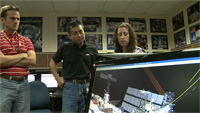
With an instructor, Wakata checks a result of the SAFER training (Credit: JAXA/NASA)
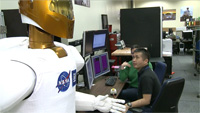
Wakata receives training in the use of the Robonaut2 (Credit: JAXA/NASA)
During the training for Extravehicular Activity (EVA), Wakata simulated the maintenance operations for the exposed equipment installed on the exterior of the ISS in the Neutral Buoyancy Laboratory (NBL), which is a large pool containing a submerged full-scale ISS mockup.
Wakata also learned how to maintain an Extravehicular Mobility Unit (EMU) and operations of the Simplified Aid for EVA Rescue (SAFER).
SAFER is attached to the bottom of the Life Support System (LSS) on the back of EMU, a small thruster system for emergencies in order for EVA astronauts to be able to come back to the ISS. Using a Virtual Reality (VR) system, Wakata was trained how to operate SAFER, simulating a case in which he gets off the ISS during EVA.
In addition, Wakata confirmed how to set up and activate the Robonaut2 (R2), the onboard humanoid robot developed to reduce the astronauts' tasks, then deactivate and stow it. He also confirmed the procedures in case of fire, rapid depressurization, or toxic spills that might occur on the ISS.
Furthermore, Wakata confirmed the operations of the Minus Eighty degree Celsius Laboratory Freezer for ISS (MELFI), operations of SSRMS to capture an approaching unmanned supply vehicle, and handling of the onboard hardware. He underwent a medical checkout to evaluate an astronaut's cognitive performance before, during and after a flight. He continued space flight training using a T-38 jet trainer.
Astronaut Kimiya Yui receives training for a long-duration ISS mission at the GCTC and JSC
Astronaut Kimiya Yui, assigned as a crew member for the ISS Expedition 44/45 mission, continues training for his upcoming mission.
In early March Yui received training for the Soyuz spacecraft at the Gagarin Cosmonaut Training Center (GCTC), continuing on from February.
After finishing the training at the GCTC, Yui returned to the U.S. and restarted training for operations on the ISS. Yui learned about the tablet computer that has been used on the ISS recently. His various training covers knowledge and techniques which are all indispensable for staying on the ISS; including supply vehicles, onboard tools, how to use the network on the ISS, inventory management on the ISS, and supporting EVA preparation.
In the meantime, he continued a series of training regimes including Russian language, flight training aboard the T-38 jet trainer, and a scuba diving test required for EVA training.
Astronaut Soichi Noguchi participates in a spacecraft operation simulator evaluation
On March 14, astronaut Soichi Noguchi participated in the evaluation test for a spacecraft operation simulator.
As a next important and indispensable step toward the development of its own or internationally cooperative human spacecraft in the future, JAXA conducts research and studies for building bases for the critical technology of human space flight, based on technology acquired through Kibo and H-II Transfer Vehicle (HTV) KOUNOTORI.
The evaluation test aims to establish prioritized technology (in terms of innovation and flexibility, e.g.) among the element technology required for human return from low-earth orbit, moon, and asteroids, as well as to clarify the system requirements and concept options of a spacecraft. By operating a simulator, Noguchi evaluated it from an astronaut's perspective
Astronaut Soichi Noguchi attended the Kibo's fifth year ceremony
On March 13, a ceremony was held in the Kibo's Mission Control Room (MCR) commemorating the fifth anniversary since the start of the operation of the Japanese Experiment Module, Kibo.
Many relevant people, mostly the members of the JAXA Flight Control Team (JFCT) attended the ceremony. Noguchi participated in the event representing JAXA astronauts. During his speech, in honor of the JFCT's great performance until now, Noguchi discussed what the team means to him.
The ceremony was open to the press, and a press conference was held after the ceremony. Noguchi discussed his reliance on the JFCT with the press.
Astronaut Akihiko Hoshide's domestic mission reporting
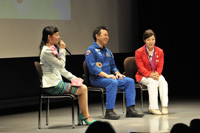
A talk show session (Credit: JAXA)
Astronaut Akihiko Hoshide, a member of the ISS Expedition 32/33 crew, stayed in Japan until early March and attended mission reporting events all over the country, carrying on from February.
On March 9, he participated in a mission reporting event for elementary and junior high school students at Yakult hall in Tokyo. Hoshide introduced his mission to the participants. Then Hoshide explained the differences between Earth and space in moving one's body and tips for doing string figures in space, actually involving participants doing exercises and making string figures.
For the subsequent talk session, Ms. Hiromi Miyake, the silver medalist in the women's 48kg weightlifting in the London Olympics appeared as a guest. She and Hoshide discussed what's important to achieve one's dreams and things they keep in mind in everyday life.
After the talk session, holding a microphone in his hand, Hoshide walked around the hall to receive and answer the children's questions. At the end of the event, Hoshide, directed a message to the assembled children, saying "I experienced a number of hardships before becoming an astronaut. I failed a lot during training. Now I think I can complete the mission because I have gone through the hardships and fails. Please do not be afraid to fail or make mistakes and take on a challenge toward the accomplishment of your dreams, so you become stronger.
New Astronauts at the Front-Line

Hello everyone.
I am writing this "the journal of a space turtle" entry, on March 31st in the plane on the way to Russia.
I know that most of you are reading this because you want to hear about space... but this time, I would like to write in a straightforward manner about some things that I am thinking about at the moment. They don't really have much to do with space but I hope you will read this all the same.
Recently, I have begun to receive messages from people who say that they have been inspired after reading about the efforts I have been making. This makes me feel like my efforts have been acknowledged and that makes me really happy. On the other hand, however, I know better than anyone that the efforts I am making are nothing special. I am not working hard enough and I am wasting time...this is really driven home to me when I hear the stories of the people who are working towards rebuilding disaster-struck areas or when I hear about people who are working hard in disadvantaged environments or those who are fighting illness. I have talked about this on Twitter before but I find the many people who create the environment in which I operate admirable and without their help, I would not be able to carry out my duties. In a way, I am like the flowers in a flowerbed.
The people who I really respect are those who work hard out-of-sight and quietly day-in day-out and who live low-profile lives while applying themselves. In this world, regardless of whether people notice them or not, there are many people who do the things they are supposed to be doing every day in a low-key manner. In reality, I think it is these kinds of people who prop up society and who make the future look so bright.
So, what should someone like me, who has their environment created for them, do for the best? I think the only way to respond is to work harder than anyone else in the world. I'm in a plane at the moment but every time I get on a plane or start a new training session, I ask myself, if something goes wrong and I die today, will I have been satisfied with my life? I consider whether I can be proud of my life or not from two different points of view. The first is: How much effort did I make to achieve my goals? I think that people who can reply in the affirmative are those who can say, 'I always did as much as I could,' when they are facing death. The other point of view is: How much did I contribute to society? To be honest, I have failed miserably at the second view. I have always had so many people to help me and so far, I have never been able to repay them.
In truth, my life's goal has recently changed to: How much I can contribute for the benefit of many other people? So, before, I used to think that I would surely be satisfied with my life on my deathbed if I had at least just worked hard but I have started to think that I am not ready to die yet! My contribution to society is still sorely lacking! I won't be able to die in peace if I don't repay in some way the people who help me, the people who pay their taxes and the people who support me! I plan to die without leaving anything behind, to simply disappear from the earth.
(These are my own thoughts and I can't say if they are right or if they are wrong. It depends on your religion or your outlook on life. I remember asking my sister a question when I was an elementary school student: 'What happens when you die?' My sister replied, 'Do you remember anything before you were born? You don't remember anything, do you? It's exactly the same thing when you die!' At that time, I had not studied history at all so I had no knowledge of anything that happened before my birth. Therefore, I was able, in my own way, to really feel the "void" that there was before I came into the world and, in the same way, the "void" that there would be after my death.)
I think that I know that it is only the impression of how much I contributed to society that will stay in people's hearts after my death. So, I want to work hard to my own satisfaction from now on and by directing this work towards helping other people, I hope that I will be satisfied with my own life from the two viewpoints I mentioned above.
The sight of people working really hard, whatever their position, inspires many other people and has a good effect on many people. There is still a lot of work for me to do before I have made enough effort to be an inspiration for a lot of people. It is easy for me to be strict with myself in my mind but it is really difficult to translate this into action. I often feel like giving up due to my mental limits before I have got to my physical limits. At such times, it is the people around me; my family, my friends and the people I work with who encourage me by telling me that I am not yet at my limits. Human beings surely have limits to how much they can achieve on their own. So I would like you, even while you are working hard at the things you are supposed to be doing, to sometimes look around you and encourage any people that you see who have reached their mental limits and look like they are giving up. And sometimes, I want you to talk to your family and friends about each other's strengths and how those strengths can be used to contribute to society. I get the feeling that, by doing this, many people will find the ability to go to the limit of the potential that lies dormant inside them by being able to contribute to society and, as a result, many people will be able to lead fulfilling lives.
I must apologise for the slightly high-and-mighty tone of this entry...
My plane is about to land in Moscow. By the time you are reading this, I will have arrived safely in Russia and I will be devoting myself to my training at Star City. It is natural that I do not take even simple things for granted and that I should keep working on the things that I can do right through to the end but I need mutual cooperation to do this. I'm going to work just as hard as all of you. And if by doing this, I can cheer everyone up, I couldn't be happier! On the other hand, if you pick up on anything in my training or activities that you think I could work harder on, feel free to say, 'Yui-san! Don't you think you could do a bit more?' There is a comment box at the bottom of this page for your opinions. We read all your messages. I would really appreciate your support so that I can test my own limits, so that I can tap the infinite potential of space a little and so that I can make a contribution to your lives as well.
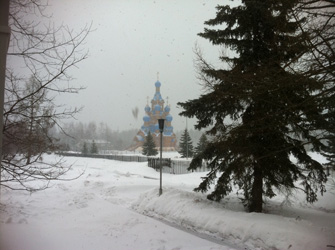
I made it to Russia safely but I didn't expect this weather! In Houston, there were some days when the temperature was over 30 degrees Celsius but it looks like the spring is a long way off here. It's hard work keeping myself healthy!
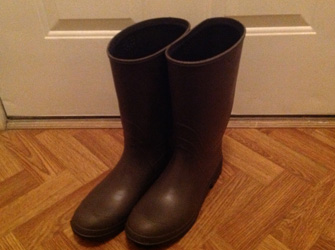
I don't have any photos that are related the subject I am writing about this time so I posted this one...
What do you think these brown rubber boots are for? That's right! They are the boots that I was talking about on Twitter!
I have to say that they are not very fashionable but they do the job! Only, I am a Japanese astronaut so it could be a problem that they look so absurd... The words fashion sense have absolutely no meaning to me!
*Photograph: JAXA

It's already a month since I came back to Houston from my immersive Russian language training in Moscow. The deadline for this month's column has crept up on me.
Well, to be honest, I have been so busy that I haven't had to the time to write the column and I was given a short extension...
I understand a little what a manga artist facing looming deadlines must feel like.
However, this column is a valuable platform through which everyone can learn about us and I am able to write what I like so I will keep on writing it as long as everyone enjoys reading it.
Having been away from my base at Houston for almost two and a half months, it was only natural that I had a lot of work to catch up on and I have been working really hard to get up to speed this past month. To give you an example, we are supposed to do 12 hours of pilot training on a T-38 jet trainer in a quarter (three months) but I spent almost two and a half of the three months away from Houston...
I managed to complete my 12 hours of training by asking fellow pilots to fly with me and so on.
I also re-commenced the CAPCOM training that had been on hold so it was a pretty productive month. I'll write about my CAPCOM training in this column sometime!
This month's topic continues on from last month about my immersive Russian language training in Moscow. The period of February to March that I spent in Moscow is the season of transition from the intense cold of the winter to spring and for someone like me, who was brought up southern Kanto in Japan, it was fairly difficult to imagine temperatures of minus 10 or 20 degrees Celsius and I really had no idea of what degrees of cold these temperatures represent. I only had the impression that winter in Russia = intense cold so I tentatively but industriously prepared my warmest clothes before my departure. I took jackets that would be easy to layer, double gloves and a hat that I could pull right down over my ears. I took boots that were made to withstand temperatures of up to minus 50 degrees Celsius but I wasn't going climbing in snowy mountains and this did end up being a bit too much (!) - I mostly walked around the city in my sneakers.
If I was to tell you what it was actually like once I got there, I could tell you that, miraculously, there was almost no snow while I was there and there were only a few days when the temperature dropped below minus 10 degrees Celsius so I was much more comfortable than I thought I would be. I love walking around towns when I am abroad so I did a lot of walking this time, too, but I got quite warm while I was walking. But as soon as I stopped, just for a little while, the biting cold would hit me again...
The most surprising thing is Moscow's readiness in the face of snow. One night, there was a heavy snowfall but early the next morning, the snowploughs were out and by the time I left for my classes, there was almost no snow left on the roads.
Another thing that surprised me in Moscow was the metro. In keeping with the fact that it is a giant metropolis, Moscow's metro system extends throughout the city and it is possible to get around the principal areas just with the metro and by walking. Upgrade work is being done year on year but the stations and the trains are fairly old in general and the metro is over-run with people all day. What is amazing is that, during the rush hour, trains arrive at the stations one after another so much so that when you see the tail end of one train disappear, the headlights of the next are already shining onto the platform.
It really makes you start wonder how on earth the trains are controlled but the system carries a countless number of people around the city and this performance must be backed up with proper safety. This reminded me of Russia's space development with the old Soyuz rocket to which repeated minor changes have been made and that is still being used to this day. A national trait of Russia may be to continue to use good things even when they are old.
My Russian language classes included a wide range of study from general grammar reviews to conversation practice and reading. We also watched Russian films and it is one of these that I would like to introduce to you here.
Ирония судьбы, или С лёгким паром! (The Irony of Fate, With light Fog!) was made in the former Soviet Union in 1975 so it is a classic. It is a very popular film nationwide in Russia and I don't think there is anyone, young or old, man or woman, who does not react to this film in the same way, saying, 'Ah yes, that film...' It seems that it is almost a tradition to watch it as a family from New Year's Eve to New Year, a bit like the Red and White Singing Contest in Japan.
The film is a slapstick rom-com but surprisingly, the set-up is that there are, for some reason, two similar apartment blocks in areas with the same name in both the cities of Moscow and Leningrad (now St. Petersburg) which are almost 700km apart and in these apartment blocks, there are two apartments that have almost the same layout, with almost the same furniture and the same key opens both their doors... It is quite an astounding set-up but the story is that this turns the fate of two couples upside down. From a Japanese point of view, if you can accept the set-up which could only be a fictional tale, it becomes a really enjoyable film with great acting and singing from the cast.
However, according to Russian people, this set-up is not necessarily a fantasy. The Soviet Union which was, at the time, under the socialist system, really had the same apartments with the same layout built in different areas and shops in which the same things were laid out in the same way. And when I asked the mother of my host family about this, she said, 'when I was at elementary school, I went to a friend's house and it had the same furniture as my house so I really thought I was in my own house.'
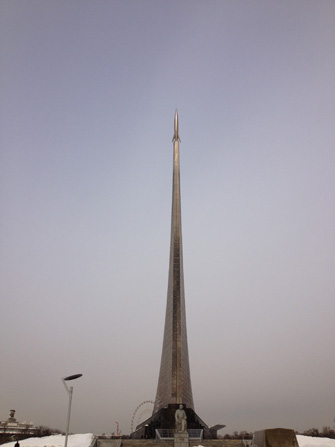
Moscow's Memorial Museum of Astronautics. This museum is a must-see for space fans. You can meet the space dogs, Belka and Strelka!
So, what do you think? Our next-door neighbour, Russia. A country that seems near and yet is so far away, Russia. Doesn't it interest you somehow? Aren't relationships between countries the same as relationships between people in that they begin by getting to know each other well. Russian people are extremely interested in Japanese culture. Haruki Murakami's novels and Japanese cartoons are very popular there. I would be very happy if the people who read this column take a little interest in the country of Russia.
*Photograph: JAXA

Hello everyone. This is the astronaut, Norishige Kanai. I hope the new financial/academic year is going well for you.
If you are a student, you will be at a new school or in a new grade and if you are working, you will be in a new department or you may be welcoming new people to your department. It is the same thing every year but I feel like the season of spring is full of new beginnings.
It was 2008 when we three new astronauts underwent astronaut screening over approximately one year. The screening results were announced at the end of March, 2009 so it has been four years since then. Maybe we're not as 'new' as we once were.
Anyway, since then, we have been training as astronaut candidates and lots of things have been really hard work ? one of those was the language barrier.
There may be those among you who wish they could speak English or who are not looking forward to overseas business trips because they are not good at languages. As a matter of fact, I spent my life thinking exactly that before I joined JAXA.
Before I joined JAXA, I worked in the Japan Maritime Self-Defense Force and I used little or no English in my everyday work.
However, sometimes there were joint manoeuvres with the US Navy or the navies of other countries, there was interaction with people from the US Navy based in Japan and in recent years the Self-Defense Force has started doing activities overseas so, thankfully, I was in an environment that encouraged the study of English in the workplace.
Once a year, those who wanted to, could take the TOEIC exam so I read study guides and studied with listening materials by myself.
It is fun to see your points increase through study each time you take the test. I also understood the fun of solving grammar questions like quizzes or puzzles.
If I had been asked the typical profile question of 'What are your hobbies?', I would probably have replied 'studying English'. There may be some strict people out there who say that English conversation is nothing more than a method of communication so it can't really be called a hobby but, at that time, for me, I must admit that studying English was like doing a crossword or playing shogi (Japanese chess).
There is the opinion that English education in Japan focuses solely on grammar and is no use for English communication but I think my own method of study was exactly the quintessential Japanese education method that is not useful for communication.
When I look back on it now, right from the start, my goal was the studying itself and I was clearly not aware of communication with foreign people being a goal. However, to cut a long story short, looking back on it now, even the 'useless' Japanese-style English study method was fairly useful in the end.
All the astronaut training since I arrived in Houston has been conducted in English (not just the language classes but training for space station systems and flight training as well). I had no idea what was going on and a lot of people were worried about this guy who didn't understand any English.
But the things that I don't understand are technical space engineering or aviation industry terms, abbreviations related to things in the space station and the native English informal slang terms (and jokes) of my instructors and classmates.
Now I can look back and say with confidence I had mastered the vocabulary and grammar for required for untroubled communication in lectures or conferences, etc. with the study that I had done in Japan.
Conversely, even now, when I participate in conversations about special devices or systems about which I have no prior knowledge, I understand just as little as I did when I first came to the US and I am still as much in the dark as I ever was when native English speakers use informal slang.
After 4 years in the US, even though I am used to the sound of English and I am capable of hearing each word in a sentence and even though I have added a few native-style informal slang expressions to my vocabulary, to be honest, I don't think that my actual linguistic knowledge of English has increased much. In fact, I have stopped studying seriously like I used to do for grammar tests before I joined JAXA and maybe my knowledge is regressing somewhat.
'Your English has really improved. It's great, you're doing really well.'
I'm not sure if they are just trying to encourage me, but a lot of my classmates and instructors say this to me. The only thing I can do is smile with embarrassment and say thank you.
There are cultural differences in how you start to talk to people in different situations as well as in conversation patterns depending on the subject and maybe the 4 years I "have spent" on the ground have been useful in helping me to understand these differences in culture. I feel like this is a little different from the true meaning of language ability but I think it is really important to understand people's ideas from the point of view of communication.
Now, another important subject in astronaut training is the study of the Russian language.
I think everyone has their own way of studying languages but, in my case for studying Russian, I think that the Japanese-style approach of strengthening my ability starting with basic grammar in the same way as I did with English is really suited to me.
My American and Canadian classmates and senior astronauts say that grammar doesn't matter in the slightest and that if you memorize lots of different words and put them together, people will understand you and they unflinchingly go off and find Russian people to communicate with. This get-up-and-go is worthy of respect and, using this method, my classmates have become good friends with Russian cosmonauts and instructors with whom they couldn't communicate before so maybe I should take a leaf out of their book.
However, in my case, I have an unassailable feeling of resistance to going against grammar and sentence structure and talking about subjects about which I am not confident (I have the same tendency when I am speaking English).
When I went to Russia's Star City for Soyuz spacecraft and space station training, the Russian that I had just started studying almost totally clammed up and I took my classes accompanied by a Russian ? English interpreter. I did sometimes criticize myself as passive but that is my nature and there is nothing I can do about it.
At NASA's Johnson Space Center in Houston, there is a language lab and specialized teachers give NASA staff and astronauts' language lessons (see photo).
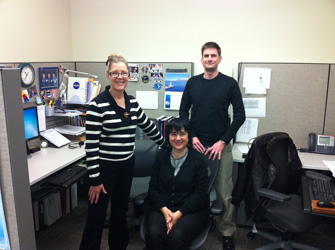
The teachers that help me all the time in the language labs (Jane (English) and Peter (Russian)) and the scheduler, Natasha (centre). There are many other teachers and everyone is very friendly and teaches very earnestly.
My Russian teachers' teaching methods have two main patterns: teachers who ignore the finer grammatical points and who place emphasis on everyday conversation and reading technical manuals, etc. and teachers who start from basic grammar with simple sentence structure and who follow the textbook.
It is sometimes difficult because the teachers change a lot but the latter pattern is the one that suits me best by far.
I feel that I can approach conversation in Russian with confidence if I am satisfied with each individual explanation of why we use one sentence structure here and why a different rule applies in a different situation. I think at the beginning that you can only say simple things within the structure you have learned but, in the end, practice kicks in and it becomes a short-cut to being able to converse accurately.
When I think about it, the Russian study that I am doing now feels like the same process that I went through when I learned English at junior high and senior high school in Japan.
It may not be a practical approach that leads directly to ability in everyday conversation in the same way as the Japanese-style English learning method but I feel that, conversely, practice kicks in in the future and that the knowledge of grammar is superior to students from other countries who do not have English as their native language.
It may be a problem with my character but I feel that the level of understanding of the person you are talking to is dramatically different depending on whether you are confident that you are speaking in a grammatically correct fashion or not, even if you are talking about the same subject.
I really feel that my knowledge of Russian grammar is starting to increase recently so it is getting to be fun like when I used to study English and get high TOEIC scores.
It might be a bit too cool to say such highbrow things as 'it is fun to learn about the culture or ways of thinking of a country by studying its language' but I think it is enough fun to try to get good scores in tests and to accumulate a quiz-type knowledge.
One thing I strongly feel from learning the two languages of English and Russian is that if you don't have the feeling that it is fun in every form, then you will not make any progress at all.
Being involved in the plans for an international space station that is a collaborative project between a number of different countries, I am able to see the different characteristics of each country (national character) in many different situations and it may be that the approach to language study also has a national character (I do think that the influence of individual character is also great).
I don't think that the Japanese-style of English study has a very positive image but even so, all Japanese people are very familiar with this method and, in my personal experience, it really helped me when I was sent abroad.
At the beginning of this new term, why not try out something new like studying English or another language?
If you keep thinking that it's fun, you are more or less guaranteed language study success (surely).
*Photograph: JAXA/NASA

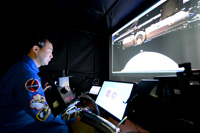
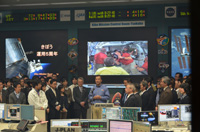
This month we introduce the staff members editing this JAXA astronaut report.
Thank you so much for reading the astronauts' report every month. I'm Anzai (pictured right), responsible for coordinating JAXA astronauts' schedules. And I'm Niizeki (pictured left), in charge of public affairs.
Before publishing this web-based content, every month we and the website staff hold a meeting called an "editorial conference" which sounds presumptuous, and we are embarrassed to call it such. Anyway we hold a meeting to discuss what we will cover for the next issue looking into JAXA astronauts' schedules, such as "Wakata received training in Russia last month. XX-san was present at the training. Let's ask him/her about the training," "Noguchi will participate in the XX symposium this month, let's collect the information," "NASA website will introduce Furukawa's activity. This should be covered in our website, too." Please remember that we do not cover all of the JAXA astronaut's activities, and the amount of information varies every month.
In the meantime, we have hoped to introduce the struggles of rookie astronauts, Yui, Onishi, and Kanai ("rookie" may not be a necessary adjective anymore.) But we have the dilemma of having little information about them because they are based in Houston and immersed in training.
So, we asked them to write what they've been doing lately. This is how "New astronauts at the front line" started. Having covered a year of activities, I hope you become familiar with their unique character.
We would be pleased to have your encouragement for their activities and future flight missions and continuous support for the JAXA astronauts.